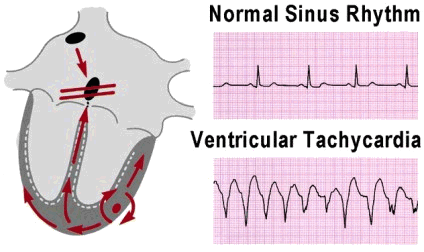Ventricular Tachycardia
Ventricular tachycardia is a rapid heart beat initiated within the ventricles, characterized by 3 or more consecutive premature ventricular beats.
Causes
Ventricular tachycardia is a potentially lethal disruption of normal heartbeat (arrhythmia) that may cause the heart to become unable to pump adequate blood through the body. The heart rate may be 160 to 240 (normal is 60 to 100 beats per minute).
Ventricular tachycardia can occur in the absence of apparent heart disease. It can also develop as an early or a late complication of a heart attack, or during the course of cardiomyopathy, valvular heart disease, myocarditis, and following heart surgery.
Healed heart attacks form scar tissue which can lead to ventricular tachycardia. This can occur days, months, or years after the heart attack.
Ventricular tachycardia can also result from anti-arrhythmic medications (an undesired effect) or from altered blood chemistries (such as a low potassium level), pH (acid-base) changes, or insufficient oxygenation.
A common mechanism for ventricular tachycardia is reentry (re-stimulation of the electrical conductive pathway from a single initial stimulus). Ventricular tachycardia is classified as nonsustained (often defined as lasting less than 30 seconds) or sustained.
"Torsade de pointes" is a form of ventricular tachycardia with a specific variation in the conduction of the ventricular stimulus.

Symptoms of Ventricular Tachycardia
Note: Symptoms may start and stop suddenly. In some cases, there are no symptoms.
• Sensation of feeling heart beats(palpatations)
• Chest discomfort (angina)
• Fainting
• Shortness of breath
Exams and Tests
Ventricular tachycardia can occur in episodes during which the person will have a rapid pulse or the symptoms described above.
The blood pressure may be normal or low. Loss of consciousness may occur. Ventricular tachycardia is a potentially lethal arrhythmia and may result in an absent pulse. Ventricular tachycardia may be seen on:
• An ECG
• A continuous ambulatory electrocardiogram (Holter monitor)
• A loop recorder, for ambulatory ECG recordings exceeding 24 hrs
• An intracardiac electrophysiology study (EPS)
Treatment
Treatment varies with the symptoms, the situation, and the underlying cardiac disorder. No treatment may be required in some cases.
Ventricular tachycardia may become an emergency situation and may be require CPR, electrical defibrillation or cardioversion (electric shock), or intravenous anti-arrhythmic medications.
Long-term treatment of ventricular tachycardia may require the use of oral anti-arrhythmic medications. Anti-arrhythmic medications, however, may have severe side effects, and their use is currently decreasing in favor of other treatments.
Some ventricular tachycardias may show in the electrophysiologic study to be suitable for an ablation procedure. Radiofrequency catheter ablation is a curative treatment for selected tachycardias.
In recent years, a preferred treatment for many chronic (long-term) ventricular tachycardias consists of implanting a device called implantable cardioverter defibrillator (ICD). The ICD is implanted usually in the chest, like a pacemaker, and it is connected to the heart with wires.
The ICD is programmed by the doctor to sense ventricular tachycardia when it is occurring, and to administer a shock to abort it. The ICD may also be programmed to send a rapid burst of paced beats to interrupt the ventricular tachycardia. The ventricular tachycardia may require also the use of concomitant anti-arrhythmic agents to prevent repeated firing of the ICD.
Outlook (Prognosis)
The outcome varies depending on the underlying cardiac disorder, the situation, and symptoms.
Possible Complications
Ventricular tachycardia may not cause symptoms in some people, but may be lethal in others -- it is a major cause of sudden cardiac death.
Acknowledgements
Heart Rhythm Specialists of South Florida gives special thanks to the National Library of Medicine and National Heart Lung and Blood Institute whose Web sites aided in the research of the patient educational material provided above.






